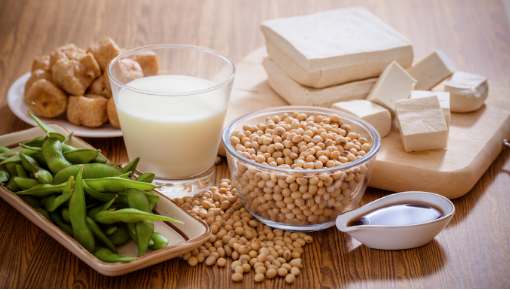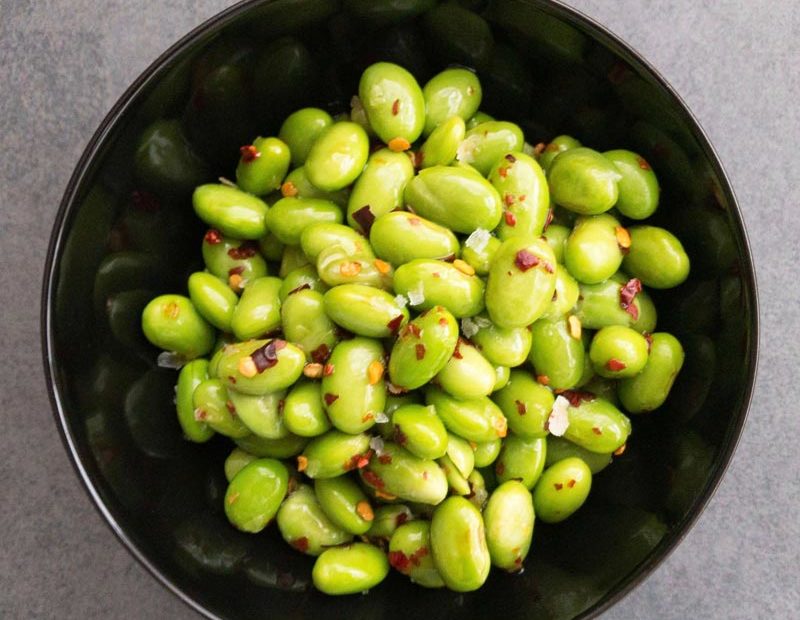What is the menopause?
Menopause signals the end of reproductive function in women due to the loss of ovarian follicles. Menstruation comes to an end and childbearing is no longer possible. This occurs differently in every woman but some common symptoms include a loss of libido, mood changes and headaches. 50.3% to 82.1% of menopausal women reported hot flushes or night sweats in one meta-analysis (a paper reviewing and combining all other publications). (1)
Medical treatments for these symptoms are available, including hormone replacement therapy. But due to the potentially negative health consequences of such therapies on cardiovascular health and breast cancer (2, 3), 40% to 50% of women in Western countries opt for complementary therapies, including plant-based therapies (4).
‘Ovarian aging is thought to be influenced by environmental factors, including nutrition.’ (5) However, the research base backing this up is currently limited: ‘…drawing definite conclusions at this time is difficult due to the limited number of studies, in consideration of the diverse single dietary exposures, and inconsistent findings.’ (6) So watch this space and return to Reset Your Health’s blog in a few years time when we can report on some more significant evidence!
For now, the general idea is that certain nutrients may help to alleviate some of the symptoms of menopause.
How soy can help with menopausal symptoms

Soy and soy products can potentially affect reproductive health and fertility because they are a rich source of phytoestrogens, which can interfere with the effects of estrogen by altering its concentrations and bioavailability and by acting as its agonists or antagonists. But current studies suggest that these potential effects are very unlikely.’ (7) The use of phytoestrogens has been associated with a decrease in the number of daily hot flashes and vaginal dryness but not in the number of night sweats (8).
Following this, any soy based product could be eaten to try and improve such symptoms: soy milk, soy yoghurt, soy sauce, soy beans or tofu. Other phytoestrogenic foods include flaxseeds, sesame seeds, hummus, miso paste, garlic, dried apricots, pistachios, chestnuts, dried dates, olive oil, broccoli and peanut butter. Click here to read more about phytoestrogen!
Calcium-rich food is important for strong bones

It is commonly known that oestrogen plays a starring role in female development during puberty and the maintenance of the menstrual cycle, but did you know that it also protects the heart by inhibiting plaque in the arteries, and it keeps our bones strong, reducing the risk of osteoporosis? (9) In this way, menopausal women have less oestrogen and are therefore possibly more at risk of osteoporosis, so calcium-rich food could be beneficial in strengthening their bones. These foods include dark leafy greens, broccoli, salmon, sardines, milk, yoghurt and cheese. Foods that are good sources of vitamin D can also support calcium absorption, such as egg yolks, tuna, mackerel, mushrooms and fortified tofu.
Eating enough calories is important for health

During menopause, the ovaries may stop producing oestrogen but a small amount is still produced from subcutaneous fat. (10) Because of this, it isn’t healthy for menopausal women to be too thin – the lack of oestrogen can result in symptoms like vaginal dryness and recurrent urinary tract infections. (11) So unsaturated fats could be a good idea to incorporate into a balanced diet – try avocados, salmon, flaxseeds, sunflower seeds, virgin olive oil and most nuts.
Conclusion
Overall, a balanced diet rich in whole plant food and plenty of hydration is recommended for optimum health. Studies with sufficient sample numbers are lacking so there is currently no significant data confirming that any diet type definitely alleviates the symptoms of menopause, so please consult a medical professional if you have any specific problems or if you plan to try any new diet. The menopause is a normal stage of life for women to go through and hopefully we can help empower you to go through it as comfortably and confidently as possible!
References
1 Franco, Chowdhury, Troup, Voortman, Kunutsor, Kavousi, Oliver-Williams and Muka. Use of Plant-Based Therapies and Menopausal Symptoms: A Systematic Review and Meta-analysis. JAMA. 2016.
2 Rossouw JE, Prentice RL, Manson JE, et al; Postmenopausal hormone therapy and risk of cardiovascular disease by age and years since menopause. JAMA. 2007
3 Beral V, Breast cancer and hormone-replacement therapy in the Million Women Study. Lancet. 2003
4 Vashisht A, Domoney CL, Cronje W, Studd JW. Prevalence of and satisfaction with complementary therapies and hormone replacement therapy in a specialist menopause clinic. Climacteric. 2001
5-7 Moslehi, Mirmiran, Tehrani and Azizi. Current Evidence on Associations of Nutritional Factors with Ovarian Reserve and Timing of Menopause: A Systematic Review Advances in Nutrition. 2017
8 Franco, Chowdhury, Troup, Voortman, Kunutsor, Kavousi, Oliver-Williams and Muka. Use of Plant-Based Therapies and Menopausal Symptoms: A Systematic Review and Meta-analysis. JAMA. 2016.
9 Estrogen’s Effects on the Female Body [Internet]. University of Rochester Medical Center. [Cited 2020Jun25]. Available from: https://www.urmc.rochester.edu/encyclopedia/content.aspx?ContentTypeID=85&ContentID=P00559
10 Cui, J. Shen, Y. and Li R. Estrogen synthesis and signaling pathways during ageing: from periphery to brain. Trends Mol Med. 2013
11 Rogers, C. Gut Well Soon. Panoma Press Ltd. 2019
